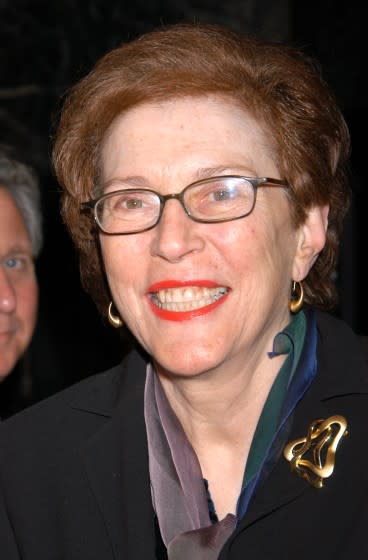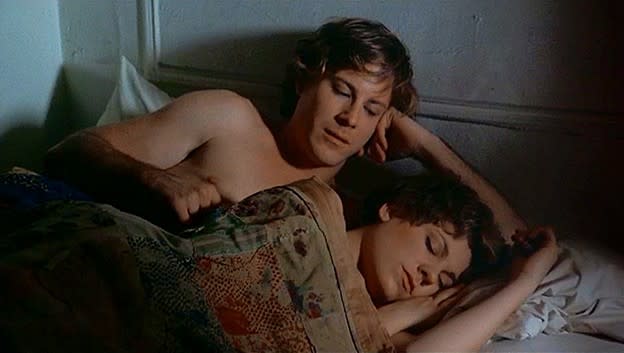Joan Micklin Silver, director of 'Hester Street' and 'Crossing Delancey,' dies at 85

Joan Micklin Silver, the groundbreaking director of such films as “Hester Street” and “Crossing Delancey,” died Thursday at her home in New York City. She was 85.
Her daughter Claudia Silver confirmed the cause of death to the New York Times as vascular dementia.
Silver was one of the few women to sustain a career as a director in Hollywood through the 1970s and ’80s. She and her husband, producer Raphael D. Silver, were innovative in the distribution of her early films, paving the way for the independent film boom of the 1990s.
In an email, former Times film critic Kenneth Turan, a longtime friend, wrote "Joan Micklin Silver was a truly underappreciated director. Not only did she make a number of features against considerable odds, they remain smart, personal and exceptionally entertaining to this day."
“She's like the perfect ’70s filmmaker,” Maya Monta?ez Smukler, author of the book “Liberating Hollywood: Women Directors and the Feminist Reform of 1970s American Cinema,” said in an interview with The Times. “Quirky characters, messy characters, relatable, familiar stories, but a little rough around the edges. That's how we think of the most beloved ’70s films.”

Born in Omaha, Silver attended Sarah Lawrence College. After making a number of short films and working as a screenwriter, she made her feature debut as writer-director in 1975 with “Hester Street,” the story of an immigrant family struggling to assimilate to life in New York’s Lower East Side in 1896. Actress Carol Kane, who was only 21 when the movie was filmed, was nominated for an Academy Award for best actress.
After making the television film “Bernice Bobs Her Hair,” an adaptation of an F. Scott Fitzgerald story starring Shelley Duvall, Silver’s second theatrical feature was 1977’s “Between the Lines,” an ensemble dramedy about an alternative newspaper in Boston in the process of being bought by a larger corporation. The cast of rising young talents included John Heard, Lindsay Crouse, Jeff Goldblum, Joe Morton, Michael J. Pollard, Stephen Collins, Gwen Welles, Jill Eikenberry and Bruno Kirby. (A restoration of the film was released in 2019.)

Silver also produced her husband’s directorial debut, the 1978 prison drama “On the Yard,” before directing her next film, an adaptation of Ann Beattie’s novel “Chilly Scenes of Winter.” Starring Heard, Mary Beth Hurt, Peter Riegert and Gloria Grahame in the story of a man unable to get over his affections for a married co-worker, the film was retitled “Head Over Heels” by United Artists before its release in 1979.
As reported by The Times’ Charles Champlin, the crew was so upset about UA’s decision to change the title that they all signed a petition in protest. The film was eventually rereleased in 1982 under its original title and with Silver’s recut ending. Champlin referred to the film as “an intelligent and attractively acted, wry study of a human relationship.”
After doing more work in television, Silver’s next feature would be an adaptation of Susan Sandler's play “Crossing Delancey” for Warner Bros., released in 1988. Starring Amy Irving as a single woman in New York City and Riegert as a pickle salesman and unlikely romantic hero, the movie remains something of the benchmark for a contemporary romantic comedy.
In a review for The Times, Sheila Benson lauded the film’s “unqualified pleasure,” adding, “it’s at once hip and romantic; wittily sophisticated and unabashedly affectionate; a love poem to all New York.”
After “Crossing Delancey,” Silver directed 1989’s “Loverboy,” starring Patrick Dempsey, and 1991’s “Big Girls Don’t Cry … They Get Even,” with an ensemble that included David Strathairn, Adrienne Shelly, Ben Savage, Jenny Lewis and Griffin Dunne. Silver continued to direct for television and theater, making one more theatrical feature with 1998’s “A Fish in the Bathtub” starring Jerry Stiller and Anne Meara.
Silver is survived by her three daughters, Claudia, Dina and Marisa; a sister, Renee; and five grandchildren. Her husband died in 2013.
Though her films have never been forgotten, with the recently renewed focus on female filmmakers in Hollywood, Silver's work has enjoyed revived interest in recent years.
“Her films are just joyous,” said Monta?ez Smukler. “She had this incredible ability to capture a realness and just the awkwardness of human nature. They are great films because she just really understood her characters. And she really understood how to make movies.
“You're laughing with a tear in your eye, but you feel reaffirmed,” Monta?ez Smukler added. “That was her magic.”
While speaking to an audience at the American Film Institute in 1991, Silver said, “Be tenacious. Be strong. Be courageous. What can I say? Keep it up. You have to learn to take rejection. You have to learn to believe in yourself.”
This story originally appeared in Los Angeles Times.